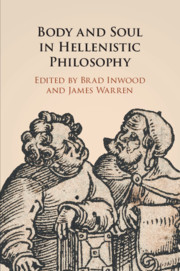Book contents
- Body and Soul in Hellenistic Philosophy
- Body and Soul in Hellenistic Philosophy
- Copyright page
- Contents
- Contributors
- Abbreviations
- Introduction
- Chapter 1 Hellenistic Medicine, Strato of Lampsacus, and Aristotle’s Theory of Soul
- Chapter 2 Herophilus and Erasistratus on the Hēgemonikon
- Chapter 3 Galen on Soul, Mixture and Pneuma
- Chapter 4 The Partition of the Soul
- Chapter 5 Cosmic and Individual Soul in Early Stoicism
- Chapter 6 Soul, Pneuma, and Blood: The Stoic Conception of the Soul
- Chapter 7 The Platonic Soul, from the Early Academy to the First Century ce
- Chapter 8 Cicero on the Soul’s Sensation of Itself: Tusculans 1.49–76
- Bibliography
- Index Locorum
- Subject Index
Chapter 7 - The Platonic Soul, from the Early Academy to the First Century ce
Published online by Cambridge University Press: 20 May 2020
- Body and Soul in Hellenistic Philosophy
- Body and Soul in Hellenistic Philosophy
- Copyright page
- Contents
- Contributors
- Abbreviations
- Introduction
- Chapter 1 Hellenistic Medicine, Strato of Lampsacus, and Aristotle’s Theory of Soul
- Chapter 2 Herophilus and Erasistratus on the Hēgemonikon
- Chapter 3 Galen on Soul, Mixture and Pneuma
- Chapter 4 The Partition of the Soul
- Chapter 5 Cosmic and Individual Soul in Early Stoicism
- Chapter 6 Soul, Pneuma, and Blood: The Stoic Conception of the Soul
- Chapter 7 The Platonic Soul, from the Early Academy to the First Century ce
- Chapter 8 Cicero on the Soul’s Sensation of Itself: Tusculans 1.49–76
- Bibliography
- Index Locorum
- Subject Index
Summary
For the modern reader, Timaeus 35a counts among the more abstruse passages in Plato’s dialogues. For ancient Platonists, too, it was considered to be obscure, yet also exerted an enduring fascination because it was believed to contain the key to understanding Plato’s concept of the soul. It provides a technical description of the composition and nature of the world soul and can therefore be used better to understand the (rational) human soul, which was held to be structured analogously. Plutarch of Chaeronea is the author of an exegetical work dedicated to this passage. Even though it is the oldest extensive treatment to have come down to us, there is strong evidence, as I hope to show, for an older exegetical tradition, going back to debates in the early Academy. This exegetical tradition may not have been continuous, but there are traces of it even in the Hellenistic era. In this essay I offer a reconstruction of the tradition preceding Plutarch.
- Type
- Chapter
- Information
- Body and Soul in Hellenistic Philosophy , pp. 171 - 198Publisher: Cambridge University PressPrint publication year: 2020
- 4
- Cited by



